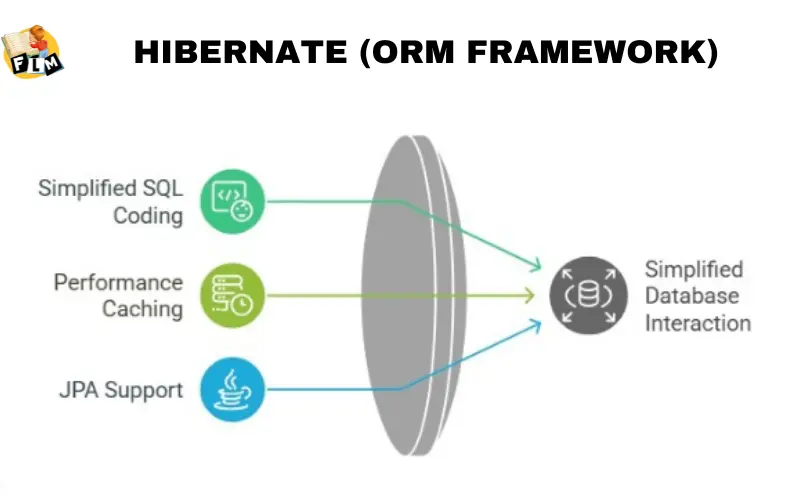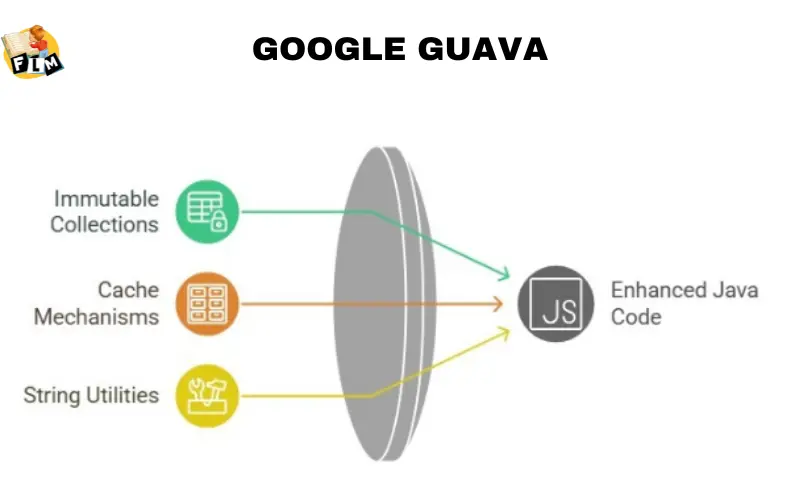Java is amongst the most popular programming languages, and all the popularity is because of the lengthy list of libraries that make it even more powerful. Libraries help the developers write clean, efficient and scalable code and save development time Whether you are developing web applications machine learning or data processing, understanding the Essential Java Libraries can make a great difference in your productivity
Apache Commons
It is one of the most popular Essential Java Libraries that offers reusable Java utility components. It is a collection of sub–projects which offer common functions like
- Commons Lang – Offers String, Number, and Object manipulation utilities
- Commons IO – Supports file handling activities like reading and writing files with efficiency
- Commons Collections – Extends the standard Java Collections framework
If you keep calling the same utility methods over and over, Apache Commons will save you a great deal of time
Google Guava
Google Guava is another Must Java Library with a rich set of utilities for collections, caching, string manipulation, and concurrency. Some of the main features are
- Immutable Collections – Prevents data structures from being changed
- Cache Mechanisms – In-built support for effective caching mechanisms
- String Utilities – Utility classes to handle string operations such as joining, splitting, and formatting
Guava assists in minimizing Java’s bulk operations, thereby making your code readable and maintainable
Jackson (JSON Processing Library)
Jackson is a light-weight library used to handle JSON data in Java applications JSON is most commonly used in APIs and web services, and Jackson offers
- Fast parsing and serialization of JSON data
- Custom support for serialization and deserialization
- Compatibility with other Java frameworks such as Spring Boot
If you are dealing with RESTful APIs, Jackson is an essential tool in your arsenal.
Gson (Google JSON Library)
Similar to Jackson, Gson is another widely used library for working with JSON in Java applications. It provides
- Easy and straightforward JSON conversion
- Support for serialization and deserialization of nested objects
- Support for working with Java Generics and nested objects
If you require a lightweight and agile JSON processing library, Gson is a great one to employ
Hibernate (ORM Framework)

Hibernate is the most popular Java library for Object-Relational Mapping (ORM). Hibernate simplifies database interaction by mapping Java objects to database tables and vice versa.
- Main features of Hibernate
- Simplifies SQL query coding
- Is cache-enabled to boost performance
- Supports Java Persistence API (JPA) seamlessly
If you’re creating Java applications that interact with databases, Hibernate is an indispensable tool for effective management of data
Log4j (Logging Framework)
Log4j is among the best Java logging APIs and an essential component of application development. It offers
- Simple logging configuration (console, file, database, etc.)
- Support for multiple logging levels (INFO, DEBUG, ERROR, etc.)
- High-performance logging with low performance penalty
Logging correctly simplifies debugging and upkeep of Java applications
JUnit (Testing Framework)
JUnit is a popular testing library for Java programs. It assists developers in successful writing and execution of automated unit tests. Some of the top features are
- Annotations to ease writing of test cases (@Test, @Before, @After, etc.)
- Assertions to check expected results
- Build tool support like Maven and Gradle
Writing test cases in terms of JUnit makes your Java programs bug-free and stable
Mockito (Mocking Framework)
Mockito is a powerful test library employed for purposes of allowing developers to make mock objects for unit testing. Main strengths include
- Easy to test with elimination of reliance on external systems
- Guarantees configurable verification and behaviour-driven testing
- Works well with JUnit seamlessly
When you are creating enterprise applications, Mockito is a wonderful tool to use in a bid to amplify your testing.
Apache POI (Processing Excel Files)
Apache POI is one of the most utilized Java libraries when it comes to processing Microsoft Office documents, including Excel files. Apache POI enables developers to
- Read and write, or manipulate, Excel (.xls and.xlsx) files
- Manipulate Word and PowerPoint documents
- Pull and manipulate data from spreadsheets
If your Java application requires handling Excel files, Apache POI is a necessity
Jsoup (HTML Parsing Library)
Jsoup is a reliable Java library for web scraping and HTML manipulation. It enables you to
- Parse HTML from websites
- Manipulate and extract HTML tags
- Interact with Java’s native Document Object Model (DOM)
Jsoup is a suitable option if you’re developing web scraping or data extraction applications
Apache Kafka (Message Streaming)
Apache Kafka is an event-based messaging system broadly utilized for processing and streaming data in real time. It provides
- High performance and scalability
- Fault-tolerant and assured messaging
- Integration with big data platforms
Kafka is very commonly used in microservices design and distributed large-scale systems
Spring Boot (Application Framework)
Spring Boot is a framework extension of Spring, which makes developing Java applications simpler. Its principal benefits are
- Support for microservices architecture out-of-the-box
- Dependency management and configuration automation
- Seamless database and cloud platform integration
Spring Boot simplifies the development and deployment of Java applications with less configuration
Lombok (Reduction of Boilerplate Code)
Lombok is a Java library that minimizes boilerplate code and keeps Java coding cleaner and quicker. Features
- Automatic generation of getters, setters, and constructors
- Simplifies logging and exceptions
- Reduces code redundancy and readability
If you are willing to write clean and efficient Java, then Lombok is a must-have tool
Conclusion
The best Java libraries suitable for use by you improve your development process in a major way, make it more productive, and make your programs more efficient. The Essential Java Libraries we have discussed above include numerous sections of Java programming, such as data processing, web programming, testing, logging, and optimization
Suggested Articles
- Current Trends in Java Full Stack Development
- Essential Tools for Java Full Stack Developers
- How to Prepare for Java Developer Interviews
Future-Proof Your Career with FLM’s AI-Powered Java Full Stack Development
Java Full Stack Developer Training
Learn Java, Spring Boot, React.js, SQL, and AI automation to build powerful web applications. AI is transforming software development, and companies need skilled Java full stack developers who can integrate AI-driven solutions. This 5+ month live, interactive training will help you master real-world projects, automation tools, and industry best practices
What You’ll Gain?
- High Demand – AI Skills Give You a Competitive Edge
- Earn ₹12 LPA+ with Java Full Stack & AI Expertise
- 100% Live, Expert-Led Training
- AI-Powered Development – Automate Coding & Debugging
- 7 Major & 7 Mini Real-World Projects for Hands-On Experience
- Mock Interviews, Resume Building & Career Guidance
- Exclusive: 2-Year Recording Access for the First 100 Enrollees
- Job-Ready Curriculum with Real-World Applications
Unlock your future with FLM’s AI-Powered Java Full Stack Development — limited seats remaining! Enroll Now
Visit: frontlinesedutech.com | Click Here to Enroll
WhatsApp: 8333077727


